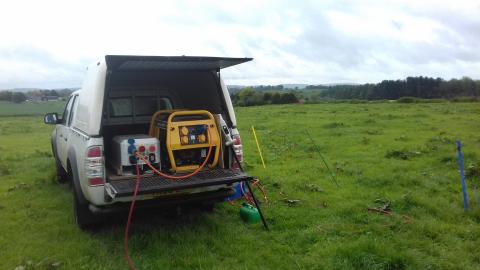10 January 2020
Two dairy farmers near Raglan, Monmouthshire, are taking part in an EIP Wales project which is one of the first of its kind in the UK to investigate how electrophysical weeding can reduce our dependency on herbicides when controlling docks. Docks can significantly reduce grazing or silage quality as they have only 65% of the feed value of grass. This, along with their ability to quickly take over fields make them a very troublesome weed for grassland farmers. There is an increasing need for the agricultural sector to move away from chemical methods of weed control due to the growing concerns of the effects that herbicides are having on both our environment and human health.
As part of this unique two year project, two grazing fields have been split into trial plots of 2m x 6m to compare the effectiveness of electrical treatment against normal herbicide application. The farmers are working with the company RootWave who is pioneering the use of electricity as a sustainable and scalable organic alternative to herbicides.
The electrical weeder is designed to send a high voltage current through the plant where the natural resistance of the weed transforms the electrical energy into heat which boils it inside out from the root upwards. For the small trial plots in the project a hand-held lance with a 20m cable powered by a petrol generator is being used. Each dock plant in a plot is touched with the charged lance for approximately 5-10 seconds before moving on to the next plant. The results from the first growing season (Figures 1 and 2) show electrical treatment has been effective at killing the docks however it was found that repeated treatments are needed to be as effective as the herbicide.
Stephen Jelley, Commercial Director for RootWave says “Benefits of using electricity include the fact that the system is precise and only kills the docks, or plants it touches. It is sustainable, residue-free, efficient and does not disturb the soil.” There are very few clover-safe options for dock herbicide sprays therefore this technology has great potential for both organic and conventional systems.
Current prices make the machine unviable for smaller farms to buy however it could be more viable if contracted in. It is early days for this technology and as with anything new, developments will lead to greater effectiveness and a reduction in price. “This unique method of dock control has great potential for both organic and conventional farmers. The technology is scalable and larger tractor based electrical weeders could be used in a variety of different farm situations” says Will John, ADAS, the Innovation Broker for the project.
Figure 1
Figure 2
The trials will continue in 2020 where some adjustments will be made to the timings of the treatments and replications.
The Rootwave Pro machine uses a petrol generator and hand-held lance with a long (~20m) cable.
Water being evaporated in the plant tissue. Each dock plant in a plot was touched with the charged lance for approximately 5-10 seconds before moving on to the next plant.
EIP Wales, which is delivered by Menter a Busnes, has received funding through the Welsh Government Rural Communities - Rural Development Programme 2014-2020, which is funded by the European Agricultural Fund for Rural Development and the Welsh Government.

